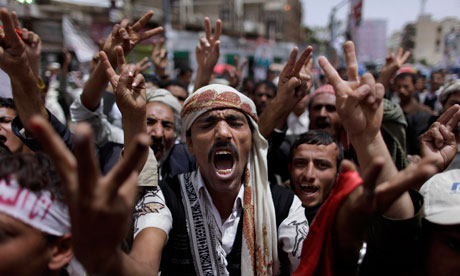Yemen violence intensifies as military skirmish leaves six dead
Showdown looms in Sana'a after troops devoted to President Saleh clash with forces loyal to General Ali Mohsin

Thousands of Yemeni protesters took part in anti-government demonstrations in Sana'a. Photograph: Muhammed Muheisen/AP
A showdown is looming in Yemen after six people were killed in a skirmish between rival military factions in the capital, Sana'a, as hundreds of thousands of anti-regime protesters rallied across the country.
The fighting broke out in the early hours, when troops devoted to President Saleh tried to wrest control of the Amran Road checkpoint, north of the capital, from forces loyal to General Ali Mohsin.
Local residents said the two sides traded fire with Kalashnikovs and rocket-propelled grenades for an hour, resulting in the death of two of Mohsin's men, three soldiers and a civilian. Mohsin, a long-time confidant of the president and head of the Yemeni army in the north-west, announced his support for "the peaceful revolution". He confirmed the decision three weeks ago by sending soldiers under his command to protect the thousands gathered in the capital demanding Saleh step down.
Since then the two sides have held strategic positions across Sana'a, with the republican guard, an elite force led by the president's son, stationed in the south of the city outside Saleh's residence. The ministry of defence and Mohsin's 1st armoured division have been guarding the young protesters camped outside Sana'a university in the north. Mohsin has kept a low public profile since his defection but hit out at regime supporters last week, by accusing them of trying to assassinate him.
An interior ministry official said that Mohsin's forces have been attacking Yemeni security forces in an effort to "expand their forces in the capital and open the doors of chaos".
"The clash between Mohsin's supporters and those loyal to Saleh is no surprise, and the longer the stalemate festers, the more likely full blown military confrontations become," said analyst Jane Novak. In addition to the dead in Sana'a, three protesters, all of them teenagers, were killed in Aden according to medical staff at Naqeeb hospital.
The violence was prompted when protesters were fired upon by Yemeni security forces as they tried to set up makeshift roadblocks to prevent tanks from reaching the protest area.
Protesters in Aden have also started using civil disobedience. Ahmed Safi, a 23-year-old medical student from the Khormaksar district said his neighbourhood looked like a "war zone", with tanks and checkpoints in place, people looting and destroying government buildings, and shops and schools closed indefinitely.
Yemen's attorney general threatened to resign unless officials went after the killers of anti-government protesters last month. Abdullah Al-Olufi said: "Those who were responsible for killing almost 60 protesters and injuring hundreds of others should be identified and brought to justice soon. If the security authorities don't identify those responsible for the massacre including those who were masked, I will step down."
Protests have continued in earnest across Yemen this week, despite efforts by Persian Gulf nations to ease tensions.
Saleh has hailed an initiative brokered by the GCC, a regional bloc of Gulf states, that would see him step down and transfer power to his deputy. He insisted, however, he would only do so when his term ended in 2013.
Yemen's opposition coalition have rejected the Gulf initiative, describing it as vague and saying offers of immunity for the president and his family were unjust. The Joint Meeting Parties bloc, Yemen's largest opposition group, said the Gulf initiative "does not clearly state that Saleh must step down and only focuses on Saleh's transferring power".
No comments:
Post a Comment